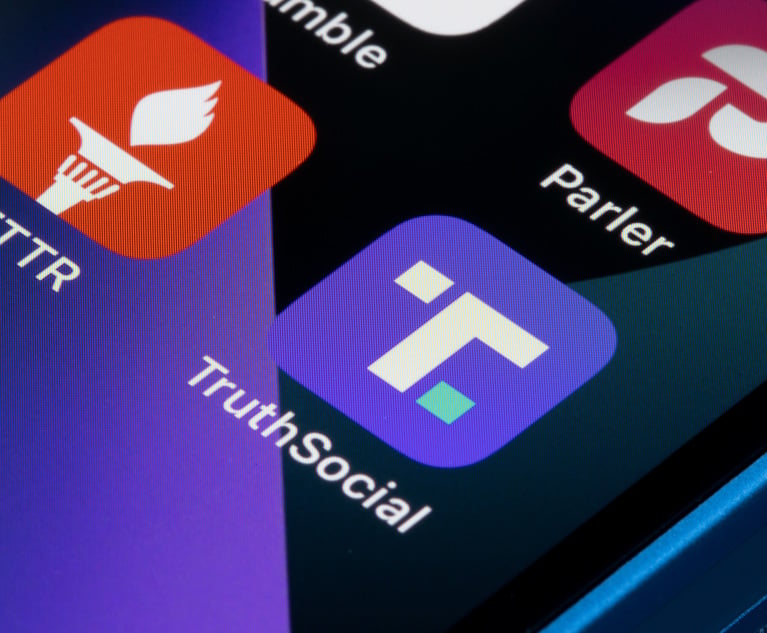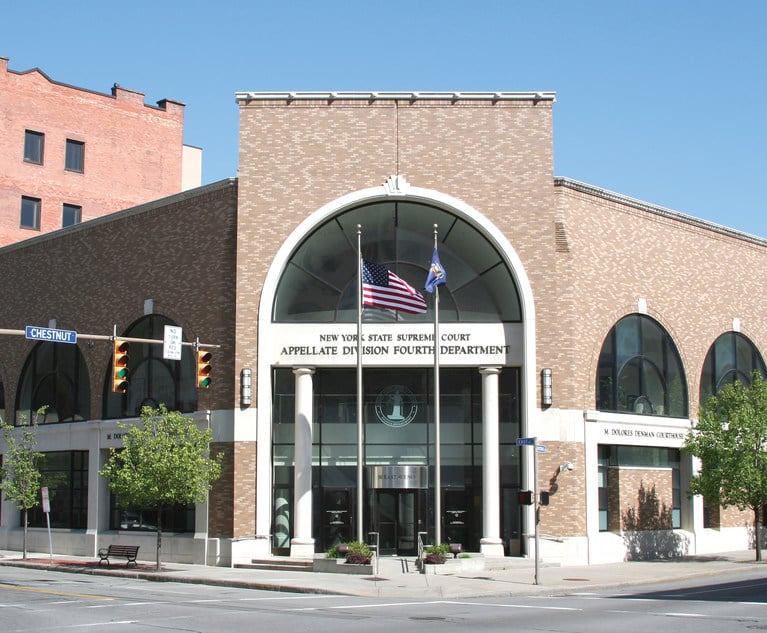Ted Leopold Takes On Corporate America
The Cohen Milstein Sellers & Toll attorney is usually out-resourced and out-manned, but that hasn't stopped him from using the law to win high-stakes, multi-million dollar cases brought against some of the world's largest companies.
January 19, 2018 at 03:20 PM
7 minute read
 Ted Leopold, partner at Cohen Milstein Sellers & Toll.
Ted Leopold, partner at Cohen Milstein Sellers & Toll.
When Ted Leopold started his career after college as a high school teacher at Coral Gables High in Miami, he didn't foresee that he would become one of the country's most prominent plaintiffs attorneys, winning millions of dollars from huge corporations.
But while working as a teacher in the 1980s, Leopold, who is now a South Florida-based partner at Cohen Milstein Sellers & Toll, realized he wanted to do important work that would make a difference in people's lives. And he recognized that the law could be a vehicle to do just that. So with financial support from his wife, he went off to law school.
“It was an opportunity to do work that would be challenging. I wanted to do work that would be important. I wanted to have an opportunity to make a difference and help people,” Leopold said. “What I've come to appreciate even more is the difference litigation can have on changing conduct, actions, corporate misconduct, things of that sort. I'm still a strong believer in that.”
That belief has paid off. This month, Leopold was appointed interim co-lead class counsel in a class action water contamination lawsuit against global chemical producer DuPont and its wholly-owned subsidiary, the Chemours Co. FC LLC. He also leads the Pulse Nightclub shooting plaintiff team in a case filed on behalf of more than 90 survivors and victims' families of the Pulse nightclub shooting in Orlando.
Among his sizeable list of big wins is one of the first and most important cases relating to managed care, Chipps v. Humana, which is still referred to in the industry today, nearly 20 years later. In 2010, he obtained a $131 million jury verdict against Ford Motor Co.—the ninth-largest verdict against an automobile company in U.S. history. More recently he successfully represented a client against Japanese company and air bag maker, Takata.
He also has worked on cases relating to automobile seat belts, roof strength and fuel tank safety that have helped make vehicles safer today—”to the point where a lot of those issues are not really issues anymore,” he said.
But he takes particular pride in having been appointed lead counsel in both the Flint case and the North Carolina case against DuPont, which alleges the companies' plant in Fayetteville dumped toxic residue from its chemicals—like GenX, the trademark substance used to make Teflon for cookware—into the Cape Fear River for decades.
“These are two important landmark cases in my view—especially today when we have an administration that is deregulating the EPA. Environmental safety is the touchstone of why we need more oversight as opposed to less,” Leopold said. “In the Flint case, the harm that has occurred to an entire community has certainly been considered front page news for several years. The GenX case is now garnering more and more attention with the misconduct by DuPont of dumping toxic waste into the Cape Fear River for over 30 years.”
Leopold credits a large part of his success to his wife and family. The former college football player had been married for only about a year when he told his wife that he thought he should go to law school. She paid his tuition and worked to support them as he went to Cumberland School of Law in Birmingham.
Leopold started his legal career at Rumberger Kirk & Caldwell in Miami, where he worked for three years before moving to Palm Beach County to join a firm that specialized in plaintiff-side automotive safety. In time, that firm became Leopold Law, a high-end boutique that specialized in automotive safety, consumer justice litigation, managed care and class action litigation. Four years ago, it merged with Washington, D.C.-based Cohen Milstein Sellers & Toll.
Leopold is chairman of Cohen Milstein's catastrophic injury and wrongful death, unsafe and defective products and managed care abuse practices, as well as co-chair of the firm's consumer protection practice and a member of its executive committee.
So what's it like to repeatedly go up against some of the largest corporations in the world?
It may seem daunting, but Leopold says he is driven in part by the idea that his clients may find justice through the equal footing that litigation provides.
“We're usually out-resourced and out-manned, but through hard work and teamwork, we're able to fight them and to bring out what the truth is and to provide justice,” Leopold said. “The obstacles of dealing with those companies and the power they have, and the money they have, and still being able to prevail is quite rewarding and helpful to those who have been harmed by their conduct.”
Leopold pointed out the five years he spent litigating Chipps v. Humana, a case brought against the largest managed care company in the world. The company fought everything, with over 300 motions to compel and more than five years obstructing discovery, he said. That case initially resulted in an $80 million verdict, reverberated through the managed care industry nationally and helped make changes seen today.
“It exposed in a remarkable way the internal nefarious acts of managed care companies, how they denied care and put corporate profits over the medical needs and care of their insured,” Leopold said. “They clearly had a lot more resources than we did, but again, through diligence and hard work and fighting them at every turn, and having the ability to go to court and find the truth, and get the truth, and get documents, that's how you can get justice.”
The $80 million verdict was overturned on appeal in 2002 after the Fourth District Court of Appeal found that the judge made a series of “glaring errors.” The ruling meant that a new jury would have to decide how much Humana should pay for its decision to stop covering therapy for Caitlyn Chipps, a young girl with cerebral palsy.
Wanting to avoid another drawn-out court battle, the Chipps family agreed to an out-of-court settlement in which Humana paid the family $2.2 million. And Caitlyn Chipps was put back on medical case management. Moreover, the landmark case laid bare for the first time the way in which managed care companies operate.
Leopold's belief in the justice system as a great equalizer, together with his competitive spirit, is what gets him through.
“if you go up against Ford or Toyota, they are the biggest companies in the world, but in a court of law, we have the ability to make them answer questions and get information from them,” he said. “It's not easy, but we're able to do that despite the power that they have.”
Theodore Leopold
Born: 1958, Coral Gables
Spouse: Roslyn
Children: Paul, Sara and Sam.
Education: Cumberland School of Law, J.D. , 1987 ; University of Miami, B.A., 1980
Experience: Partner, Cohen Milstein Sellers & Toll, 2014-present ; Partner, Leopold Law, 2007-2013; Partner, Ricci Leopold, 1990-2007; Rumberger, Kirk & Caldwell, 1987-1990; Teacher, Coral Gables High School , 1980-1983
This story has been updated to clarify that the Chipps v. Humana lawsuit was overturned on appeal and ultimately the family and Humana reached a settlement.
This content has been archived. It is available through our partners, LexisNexis® and Bloomberg Law.
To view this content, please continue to their sites.
Not a Lexis Subscriber?
Subscribe Now
Not a Bloomberg Law Subscriber?
Subscribe Now
NOT FOR REPRINT
© 2025 ALM Global, LLC, All Rights Reserved. Request academic re-use from www.copyright.com. All other uses, submit a request to [email protected]. For more information visit Asset & Logo Licensing.
You Might Like
View All
Trump Media Accuses Purchaser Rep of Extortion, Harassment After Merger
4 minute read
Who Got the Work: Array of National Lawyers Appearing in Appeal Over Social Media Role in Buffalo Massacre

Tax Company Exactera Sues Ex-CEO, Alleging Harassing Litigation

New Precedent: Lawyers Took Too Long, So Litigants Struck a Doomed Deal
Trending Stories
- 1Restoring Trust in the Courts Starts in New York
- 2'Pull Back the Curtain': Ex-NFL Players Seek Discovery in Lawsuit Over League's Disability Plan
- 3Tensions Run High at Final Hearing Before Manhattan Congestion Pricing Takes Effect
- 4Improper Removal to Fed. Court Leads to $100K Bill for Blue Cross Blue Shield
- 5Michael Halpern, Beloved Key West Attorney, Dies at 72
Who Got The Work
Michael G. Bongiorno, Andrew Scott Dulberg and Elizabeth E. Driscoll from Wilmer Cutler Pickering Hale and Dorr have stepped in to represent Symbotic Inc., an A.I.-enabled technology platform that focuses on increasing supply chain efficiency, and other defendants in a pending shareholder derivative lawsuit. The case, filed Oct. 2 in Massachusetts District Court by the Brown Law Firm on behalf of Stephen Austen, accuses certain officers and directors of misleading investors in regard to Symbotic's potential for margin growth by failing to disclose that the company was not equipped to timely deploy its systems or manage expenses through project delays. The case, assigned to U.S. District Judge Nathaniel M. Gorton, is 1:24-cv-12522, Austen v. Cohen et al.
Who Got The Work
Edmund Polubinski and Marie Killmond of Davis Polk & Wardwell have entered appearances for data platform software development company MongoDB and other defendants in a pending shareholder derivative lawsuit. The action, filed Oct. 7 in New York Southern District Court by the Brown Law Firm, accuses the company's directors and/or officers of falsely expressing confidence in the company’s restructuring of its sales incentive plan and downplaying the severity of decreases in its upfront commitments. The case is 1:24-cv-07594, Roy v. Ittycheria et al.
Who Got The Work
Amy O. Bruchs and Kurt F. Ellison of Michael Best & Friedrich have entered appearances for Epic Systems Corp. in a pending employment discrimination lawsuit. The suit was filed Sept. 7 in Wisconsin Western District Court by Levine Eisberner LLC and Siri & Glimstad on behalf of a project manager who claims that he was wrongfully terminated after applying for a religious exemption to the defendant's COVID-19 vaccine mandate. The case, assigned to U.S. Magistrate Judge Anita Marie Boor, is 3:24-cv-00630, Secker, Nathan v. Epic Systems Corporation.
Who Got The Work
David X. Sullivan, Thomas J. Finn and Gregory A. Hall from McCarter & English have entered appearances for Sunrun Installation Services in a pending civil rights lawsuit. The complaint was filed Sept. 4 in Connecticut District Court by attorney Robert M. Berke on behalf of former employee George Edward Steins, who was arrested and charged with employing an unregistered home improvement salesperson. The complaint alleges that had Sunrun informed the Connecticut Department of Consumer Protection that the plaintiff's employment had ended in 2017 and that he no longer held Sunrun's home improvement contractor license, he would not have been hit with charges, which were dismissed in May 2024. The case, assigned to U.S. District Judge Jeffrey A. Meyer, is 3:24-cv-01423, Steins v. Sunrun, Inc. et al.
Who Got The Work
Greenberg Traurig shareholder Joshua L. Raskin has entered an appearance for boohoo.com UK Ltd. in a pending patent infringement lawsuit. The suit, filed Sept. 3 in Texas Eastern District Court by Rozier Hardt McDonough on behalf of Alto Dynamics, asserts five patents related to an online shopping platform. The case, assigned to U.S. District Judge Rodney Gilstrap, is 2:24-cv-00719, Alto Dynamics, LLC v. boohoo.com UK Limited.
Featured Firms
Law Offices of Gary Martin Hays & Associates, P.C.
(470) 294-1674
Law Offices of Mark E. Salomone
(857) 444-6468
Smith & Hassler
(713) 739-1250






